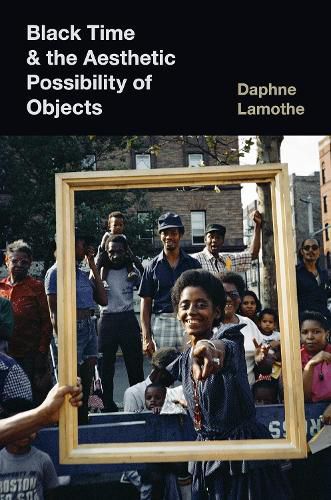Readings Newsletter
Become a Readings Member to make your shopping experience even easier.
Sign in or sign up for free!
You’re not far away from qualifying for FREE standard shipping within Australia
You’ve qualified for FREE standard shipping within Australia
The cart is loading…






The decades following the civil rights and decolonization movements of the sixties and seventies-termed the post-soul era-created new ways to understand the aesthetics of global racial representation. Daphne Lamothe shows that beginning around 1980 and continuing to the present day, Black literature, art, and music resisted the pull of singular and universal notions of racial identity. Developing the idea of "Black aesthetic time"-a multipronged theoretical concept that analyzes the ways race and time collide in the process of cultural production-she assesses Black fiction, poetry, and visual and musical texts by Paule Marshall, Zadie Smith, Tracy K. Smith, Dionne Brand, Toyin Ojih Odutola, and Stromae, among others. Lamothe asks how our understanding of Blackness might expand upon viewing racial representation without borders-or, to use her concept, from the permeable, supple place of Black aesthetic time.
Lamothe purposefully focuses on texts told from the vantage point of immigrants, migrants, and city dwellers to conceptualize Blackness as a global phenomenon without assuming the universality or homogeneity of racialized experience. In this new way to analyze Black global art, Lamothe foregrounds migratory subjects poised on thresholds between not only old and new worlds, but old and new selves.
$9.00 standard shipping within Australia
FREE standard shipping within Australia for orders over $100.00
Express & International shipping calculated at checkout
Stock availability can be subject to change without notice. We recommend calling the shop or contacting our online team to check availability of low stock items. Please see our Shopping Online page for more details.
The decades following the civil rights and decolonization movements of the sixties and seventies-termed the post-soul era-created new ways to understand the aesthetics of global racial representation. Daphne Lamothe shows that beginning around 1980 and continuing to the present day, Black literature, art, and music resisted the pull of singular and universal notions of racial identity. Developing the idea of "Black aesthetic time"-a multipronged theoretical concept that analyzes the ways race and time collide in the process of cultural production-she assesses Black fiction, poetry, and visual and musical texts by Paule Marshall, Zadie Smith, Tracy K. Smith, Dionne Brand, Toyin Ojih Odutola, and Stromae, among others. Lamothe asks how our understanding of Blackness might expand upon viewing racial representation without borders-or, to use her concept, from the permeable, supple place of Black aesthetic time.
Lamothe purposefully focuses on texts told from the vantage point of immigrants, migrants, and city dwellers to conceptualize Blackness as a global phenomenon without assuming the universality or homogeneity of racialized experience. In this new way to analyze Black global art, Lamothe foregrounds migratory subjects poised on thresholds between not only old and new worlds, but old and new selves.